BLO5540: Director Duties and Corporate Law on Illegal Phoenix Activity
VerifiedAdded on 2023/04/24
|9
|2865
|190
Essay
AI Summary
This essay critically evaluates the effectiveness of the current director duties and corporate law regime in Australia, specifically in addressing the issue of illegal phoenix company activity. It examines the relevant provisions of the Corporations Act 2001 (Cth) and the duties imposed on directors, highlighting the gaps and limitations in the existing legal framework. The essay discusses the characteristics of illegal phoenix activity, the challenges in defining and penalizing it, and the role of regulatory bodies like ASIC. Furthermore, it assesses the impact of proposed reforms, such as the Treasury Laws Amendment (Combating Illegal Phoenixing) Bill 2018 and related measures, analyzing their potential effectiveness in deterring and disrupting illegal phoenixing practices. The analysis includes relevant case law and emphasizes the need for clearer definitions and stronger enforcement mechanisms to protect creditors, employees, and the broader economy from the detrimental effects of illegal phoenix activity.
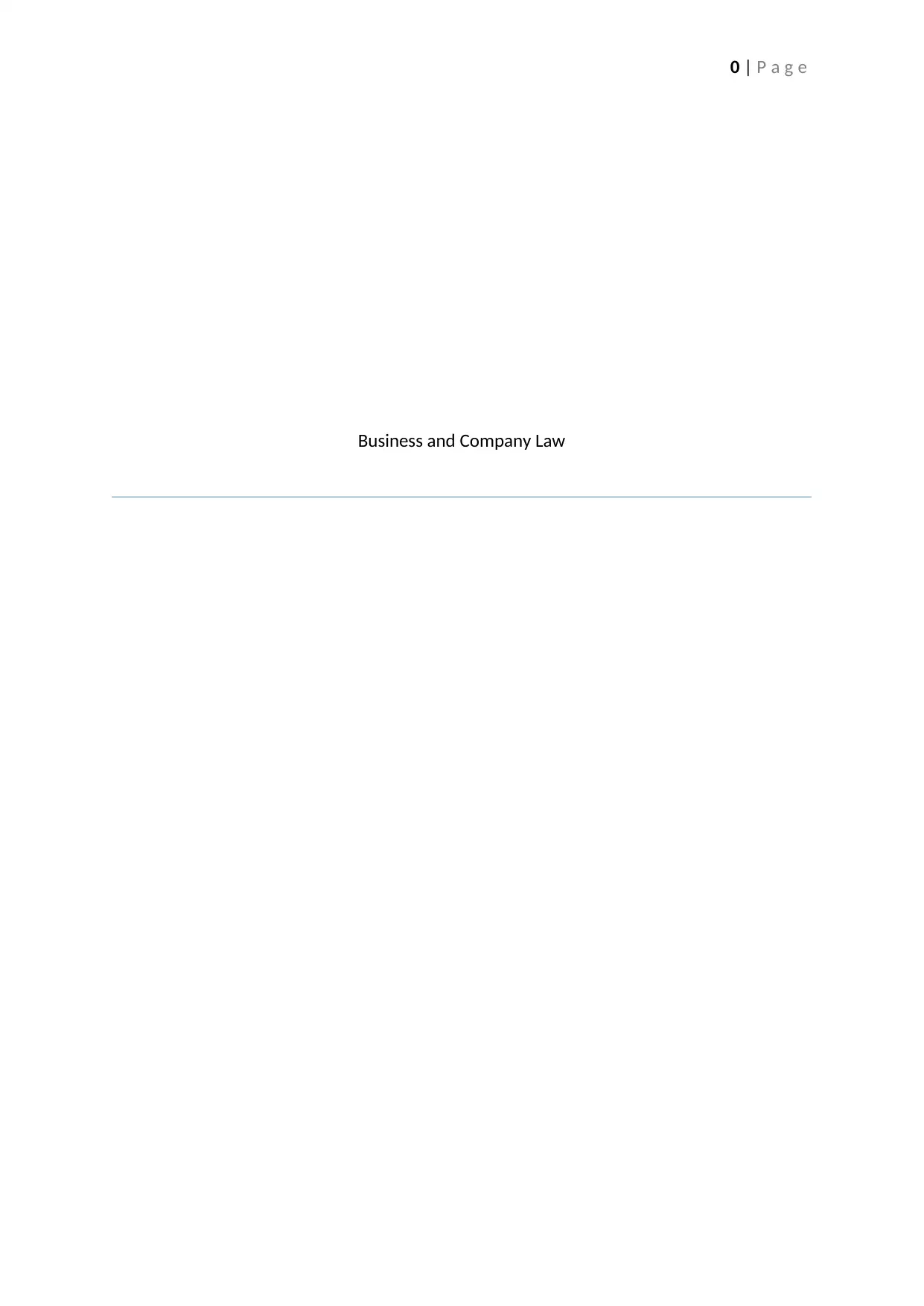
0 | P a g e
Business and Company Law
Business and Company Law
Paraphrase This Document
Need a fresh take? Get an instant paraphrase of this document with our AI Paraphraser
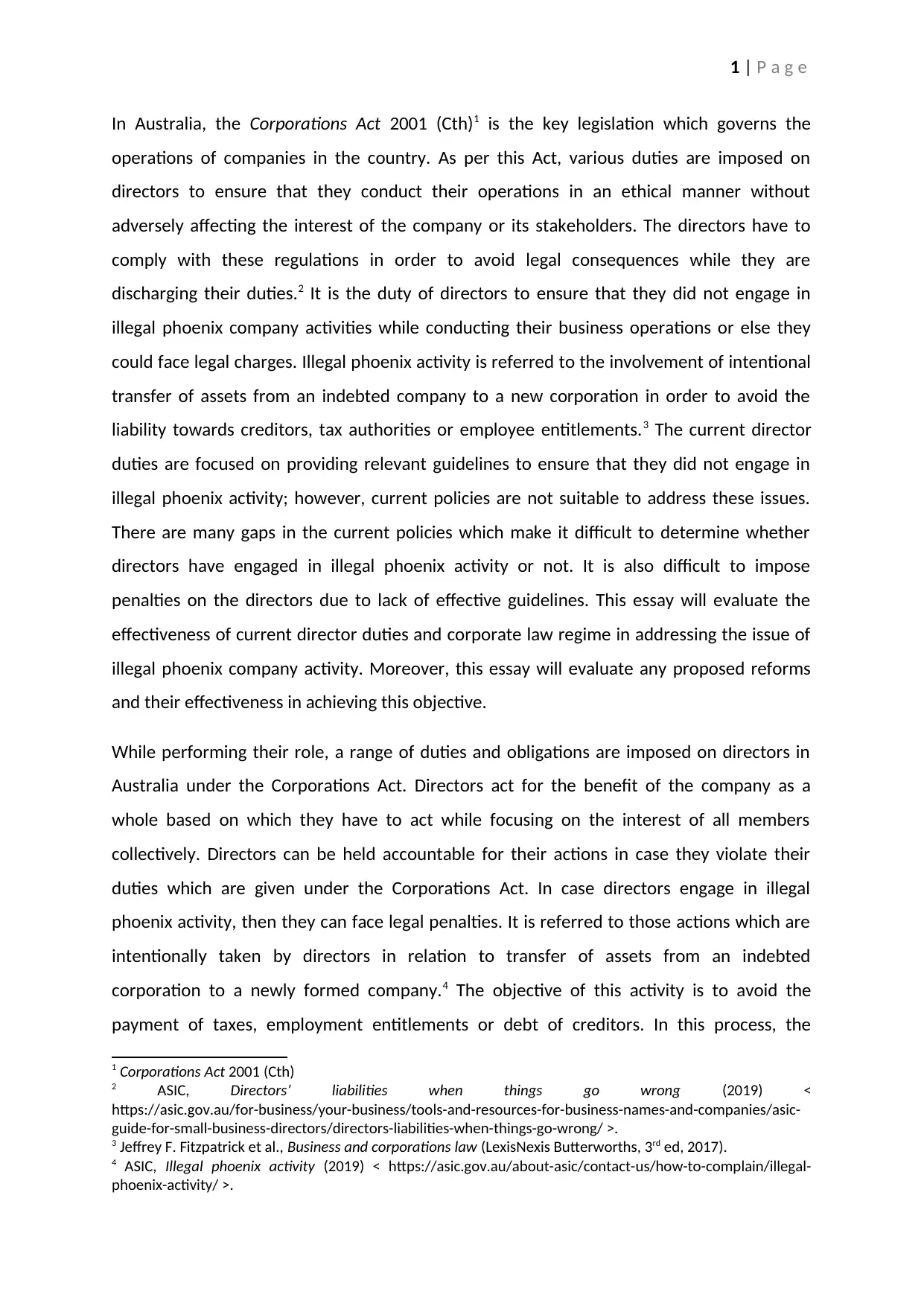
1 | P a g e
In Australia, the Corporations Act 2001 (Cth)1 is the key legislation which governs the
operations of companies in the country. As per this Act, various duties are imposed on
directors to ensure that they conduct their operations in an ethical manner without
adversely affecting the interest of the company or its stakeholders. The directors have to
comply with these regulations in order to avoid legal consequences while they are
discharging their duties.2 It is the duty of directors to ensure that they did not engage in
illegal phoenix company activities while conducting their business operations or else they
could face legal charges. Illegal phoenix activity is referred to the involvement of intentional
transfer of assets from an indebted company to a new corporation in order to avoid the
liability towards creditors, tax authorities or employee entitlements.3 The current director
duties are focused on providing relevant guidelines to ensure that they did not engage in
illegal phoenix activity; however, current policies are not suitable to address these issues.
There are many gaps in the current policies which make it difficult to determine whether
directors have engaged in illegal phoenix activity or not. It is also difficult to impose
penalties on the directors due to lack of effective guidelines. This essay will evaluate the
effectiveness of current director duties and corporate law regime in addressing the issue of
illegal phoenix company activity. Moreover, this essay will evaluate any proposed reforms
and their effectiveness in achieving this objective.
While performing their role, a range of duties and obligations are imposed on directors in
Australia under the Corporations Act. Directors act for the benefit of the company as a
whole based on which they have to act while focusing on the interest of all members
collectively. Directors can be held accountable for their actions in case they violate their
duties which are given under the Corporations Act. In case directors engage in illegal
phoenix activity, then they can face legal penalties. It is referred to those actions which are
intentionally taken by directors in relation to transfer of assets from an indebted
corporation to a newly formed company.4 The objective of this activity is to avoid the
payment of taxes, employment entitlements or debt of creditors. In this process, the
1 Corporations Act 2001 (Cth)
2 ASIC, Directors’ liabilities when things go wrong (2019) <
https://asic.gov.au/for-business/your-business/tools-and-resources-for-business-names-and-companies/asic-
guide-for-small-business-directors/directors-liabilities-when-things-go-wrong/ >.
3 Jeffrey F. Fitzpatrick et al., Business and corporations law (LexisNexis Butterworths, 3rd ed, 2017).
4 ASIC, Illegal phoenix activity (2019) < https://asic.gov.au/about-asic/contact-us/how-to-complain/illegal-
phoenix-activity/ >.
In Australia, the Corporations Act 2001 (Cth)1 is the key legislation which governs the
operations of companies in the country. As per this Act, various duties are imposed on
directors to ensure that they conduct their operations in an ethical manner without
adversely affecting the interest of the company or its stakeholders. The directors have to
comply with these regulations in order to avoid legal consequences while they are
discharging their duties.2 It is the duty of directors to ensure that they did not engage in
illegal phoenix company activities while conducting their business operations or else they
could face legal charges. Illegal phoenix activity is referred to the involvement of intentional
transfer of assets from an indebted company to a new corporation in order to avoid the
liability towards creditors, tax authorities or employee entitlements.3 The current director
duties are focused on providing relevant guidelines to ensure that they did not engage in
illegal phoenix activity; however, current policies are not suitable to address these issues.
There are many gaps in the current policies which make it difficult to determine whether
directors have engaged in illegal phoenix activity or not. It is also difficult to impose
penalties on the directors due to lack of effective guidelines. This essay will evaluate the
effectiveness of current director duties and corporate law regime in addressing the issue of
illegal phoenix company activity. Moreover, this essay will evaluate any proposed reforms
and their effectiveness in achieving this objective.
While performing their role, a range of duties and obligations are imposed on directors in
Australia under the Corporations Act. Directors act for the benefit of the company as a
whole based on which they have to act while focusing on the interest of all members
collectively. Directors can be held accountable for their actions in case they violate their
duties which are given under the Corporations Act. In case directors engage in illegal
phoenix activity, then they can face legal penalties. It is referred to those actions which are
intentionally taken by directors in relation to transfer of assets from an indebted
corporation to a newly formed company.4 The objective of this activity is to avoid the
payment of taxes, employment entitlements or debt of creditors. In this process, the
1 Corporations Act 2001 (Cth)
2 ASIC, Directors’ liabilities when things go wrong (2019) <
https://asic.gov.au/for-business/your-business/tools-and-resources-for-business-names-and-companies/asic-
guide-for-small-business-directors/directors-liabilities-when-things-go-wrong/ >.
3 Jeffrey F. Fitzpatrick et al., Business and corporations law (LexisNexis Butterworths, 3rd ed, 2017).
4 ASIC, Illegal phoenix activity (2019) < https://asic.gov.au/about-asic/contact-us/how-to-complain/illegal-
phoenix-activity/ >.
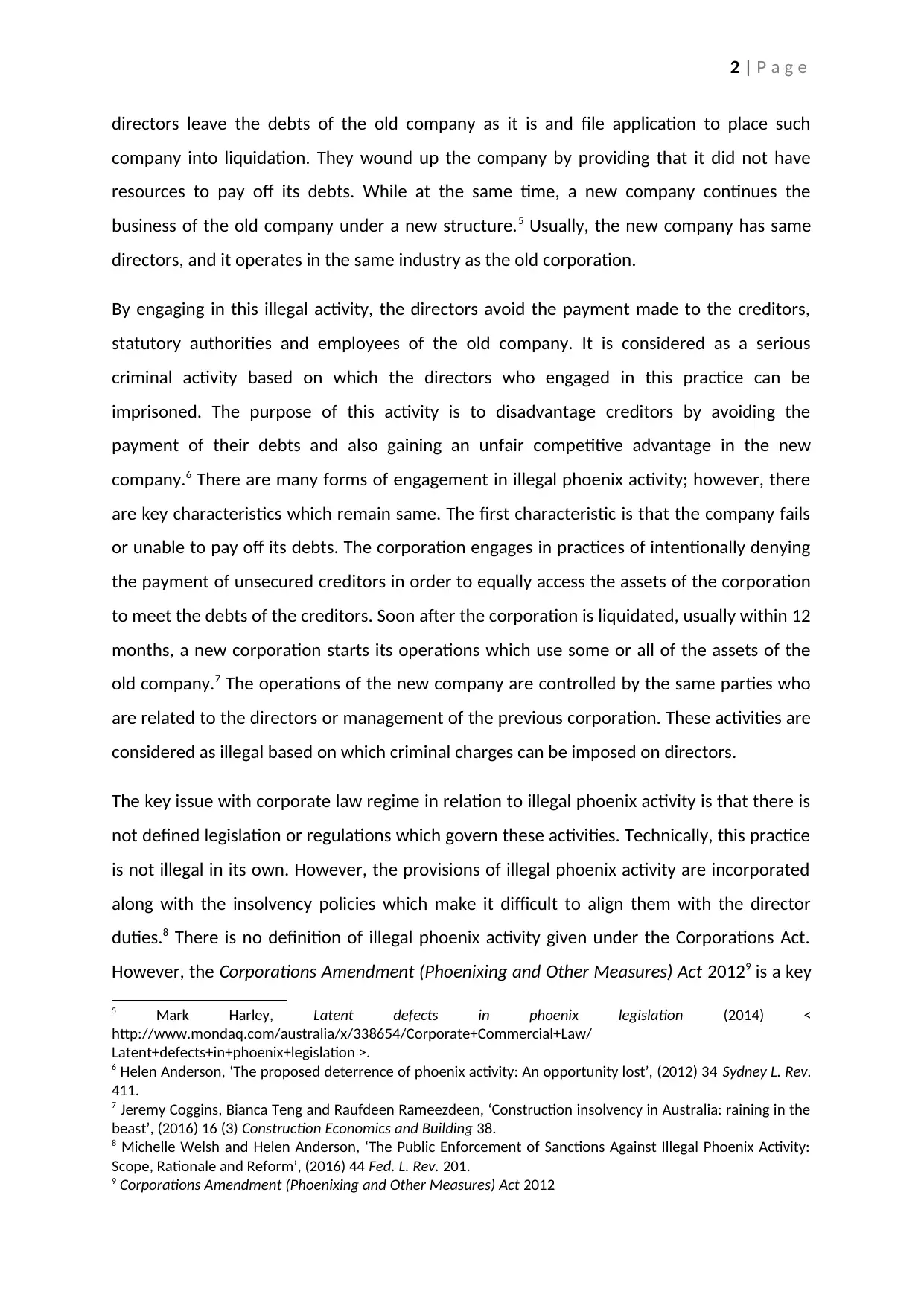
2 | P a g e
directors leave the debts of the old company as it is and file application to place such
company into liquidation. They wound up the company by providing that it did not have
resources to pay off its debts. While at the same time, a new company continues the
business of the old company under a new structure.5 Usually, the new company has same
directors, and it operates in the same industry as the old corporation.
By engaging in this illegal activity, the directors avoid the payment made to the creditors,
statutory authorities and employees of the old company. It is considered as a serious
criminal activity based on which the directors who engaged in this practice can be
imprisoned. The purpose of this activity is to disadvantage creditors by avoiding the
payment of their debts and also gaining an unfair competitive advantage in the new
company.6 There are many forms of engagement in illegal phoenix activity; however, there
are key characteristics which remain same. The first characteristic is that the company fails
or unable to pay off its debts. The corporation engages in practices of intentionally denying
the payment of unsecured creditors in order to equally access the assets of the corporation
to meet the debts of the creditors. Soon after the corporation is liquidated, usually within 12
months, a new corporation starts its operations which use some or all of the assets of the
old company.7 The operations of the new company are controlled by the same parties who
are related to the directors or management of the previous corporation. These activities are
considered as illegal based on which criminal charges can be imposed on directors.
The key issue with corporate law regime in relation to illegal phoenix activity is that there is
not defined legislation or regulations which govern these activities. Technically, this practice
is not illegal in its own. However, the provisions of illegal phoenix activity are incorporated
along with the insolvency policies which make it difficult to align them with the director
duties.8 There is no definition of illegal phoenix activity given under the Corporations Act.
However, the Corporations Amendment (Phoenixing and Other Measures) Act 20129 is a key
5 Mark Harley, Latent defects in phoenix legislation (2014) <
http://www.mondaq.com/australia/x/338654/Corporate+Commercial+Law/
Latent+defects+in+phoenix+legislation >.
6 Helen Anderson, ‘The proposed deterrence of phoenix activity: An opportunity lost’, (2012) 34 Sydney L. Rev.
411.
7 Jeremy Coggins, Bianca Teng and Raufdeen Rameezdeen, ‘Construction insolvency in Australia: raining in the
beast’, (2016) 16 (3) Construction Economics and Building 38.
8 Michelle Welsh and Helen Anderson, ‘The Public Enforcement of Sanctions Against Illegal Phoenix Activity:
Scope, Rationale and Reform’, (2016) 44 Fed. L. Rev. 201.
9 Corporations Amendment (Phoenixing and Other Measures) Act 2012
directors leave the debts of the old company as it is and file application to place such
company into liquidation. They wound up the company by providing that it did not have
resources to pay off its debts. While at the same time, a new company continues the
business of the old company under a new structure.5 Usually, the new company has same
directors, and it operates in the same industry as the old corporation.
By engaging in this illegal activity, the directors avoid the payment made to the creditors,
statutory authorities and employees of the old company. It is considered as a serious
criminal activity based on which the directors who engaged in this practice can be
imprisoned. The purpose of this activity is to disadvantage creditors by avoiding the
payment of their debts and also gaining an unfair competitive advantage in the new
company.6 There are many forms of engagement in illegal phoenix activity; however, there
are key characteristics which remain same. The first characteristic is that the company fails
or unable to pay off its debts. The corporation engages in practices of intentionally denying
the payment of unsecured creditors in order to equally access the assets of the corporation
to meet the debts of the creditors. Soon after the corporation is liquidated, usually within 12
months, a new corporation starts its operations which use some or all of the assets of the
old company.7 The operations of the new company are controlled by the same parties who
are related to the directors or management of the previous corporation. These activities are
considered as illegal based on which criminal charges can be imposed on directors.
The key issue with corporate law regime in relation to illegal phoenix activity is that there is
not defined legislation or regulations which govern these activities. Technically, this practice
is not illegal in its own. However, the provisions of illegal phoenix activity are incorporated
along with the insolvency policies which make it difficult to align them with the director
duties.8 There is no definition of illegal phoenix activity given under the Corporations Act.
However, the Corporations Amendment (Phoenixing and Other Measures) Act 20129 is a key
5 Mark Harley, Latent defects in phoenix legislation (2014) <
http://www.mondaq.com/australia/x/338654/Corporate+Commercial+Law/
Latent+defects+in+phoenix+legislation >.
6 Helen Anderson, ‘The proposed deterrence of phoenix activity: An opportunity lost’, (2012) 34 Sydney L. Rev.
411.
7 Jeremy Coggins, Bianca Teng and Raufdeen Rameezdeen, ‘Construction insolvency in Australia: raining in the
beast’, (2016) 16 (3) Construction Economics and Building 38.
8 Michelle Welsh and Helen Anderson, ‘The Public Enforcement of Sanctions Against Illegal Phoenix Activity:
Scope, Rationale and Reform’, (2016) 44 Fed. L. Rev. 201.
9 Corporations Amendment (Phoenixing and Other Measures) Act 2012
⊘ This is a preview!⊘
Do you want full access?
Subscribe today to unlock all pages.

Trusted by 1+ million students worldwide
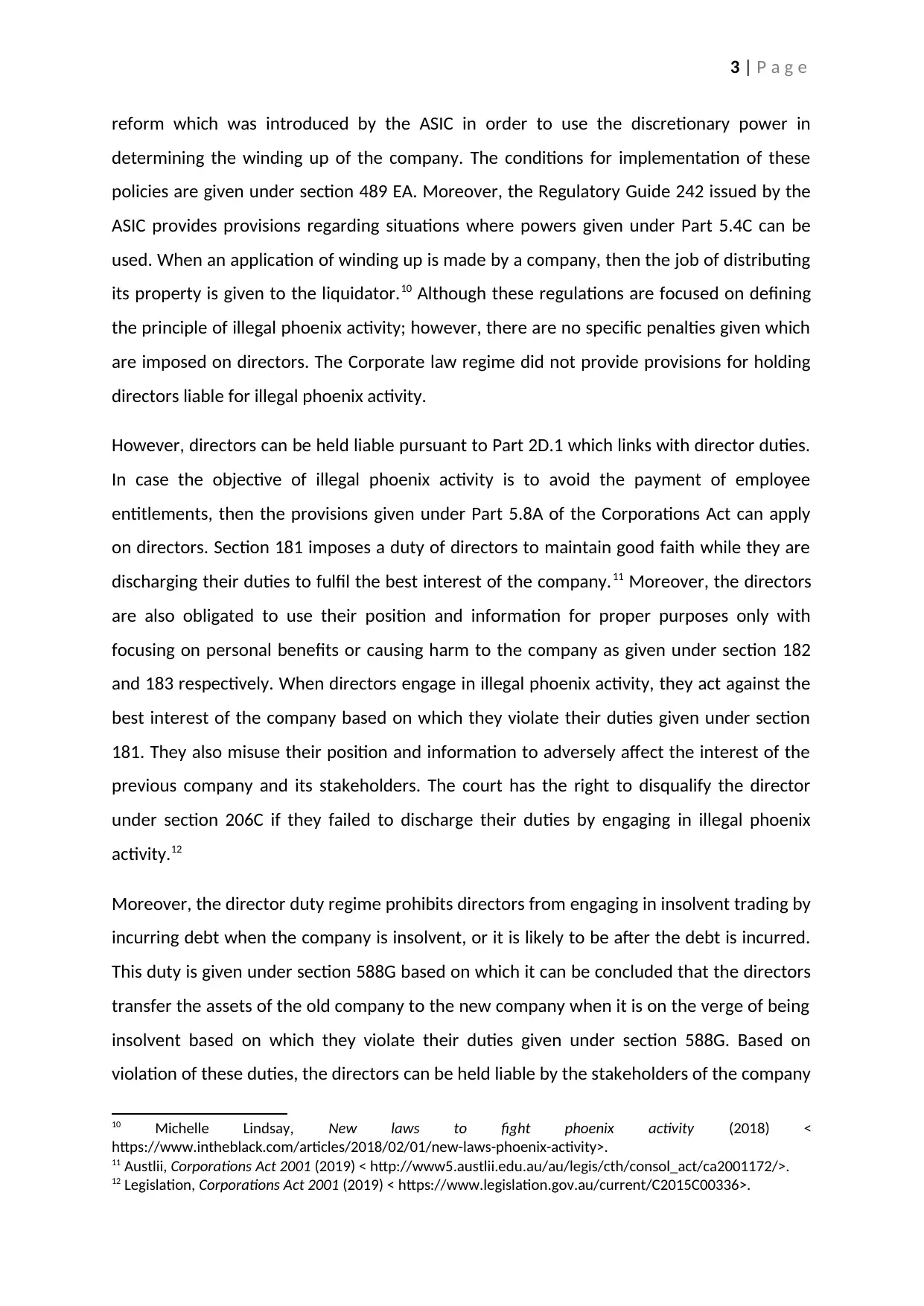
3 | P a g e
reform which was introduced by the ASIC in order to use the discretionary power in
determining the winding up of the company. The conditions for implementation of these
policies are given under section 489 EA. Moreover, the Regulatory Guide 242 issued by the
ASIC provides provisions regarding situations where powers given under Part 5.4C can be
used. When an application of winding up is made by a company, then the job of distributing
its property is given to the liquidator.10 Although these regulations are focused on defining
the principle of illegal phoenix activity; however, there are no specific penalties given which
are imposed on directors. The Corporate law regime did not provide provisions for holding
directors liable for illegal phoenix activity.
However, directors can be held liable pursuant to Part 2D.1 which links with director duties.
In case the objective of illegal phoenix activity is to avoid the payment of employee
entitlements, then the provisions given under Part 5.8A of the Corporations Act can apply
on directors. Section 181 imposes a duty of directors to maintain good faith while they are
discharging their duties to fulfil the best interest of the company.11 Moreover, the directors
are also obligated to use their position and information for proper purposes only with
focusing on personal benefits or causing harm to the company as given under section 182
and 183 respectively. When directors engage in illegal phoenix activity, they act against the
best interest of the company based on which they violate their duties given under section
181. They also misuse their position and information to adversely affect the interest of the
previous company and its stakeholders. The court has the right to disqualify the director
under section 206C if they failed to discharge their duties by engaging in illegal phoenix
activity.12
Moreover, the director duty regime prohibits directors from engaging in insolvent trading by
incurring debt when the company is insolvent, or it is likely to be after the debt is incurred.
This duty is given under section 588G based on which it can be concluded that the directors
transfer the assets of the old company to the new company when it is on the verge of being
insolvent based on which they violate their duties given under section 588G. Based on
violation of these duties, the directors can be held liable by the stakeholders of the company
10 Michelle Lindsay, New laws to fight phoenix activity (2018) <
https://www.intheblack.com/articles/2018/02/01/new-laws-phoenix-activity>.
11 Austlii, Corporations Act 2001 (2019) < http://www5.austlii.edu.au/au/legis/cth/consol_act/ca2001172/>.
12 Legislation, Corporations Act 2001 (2019) < https://www.legislation.gov.au/current/C2015C00336>.
reform which was introduced by the ASIC in order to use the discretionary power in
determining the winding up of the company. The conditions for implementation of these
policies are given under section 489 EA. Moreover, the Regulatory Guide 242 issued by the
ASIC provides provisions regarding situations where powers given under Part 5.4C can be
used. When an application of winding up is made by a company, then the job of distributing
its property is given to the liquidator.10 Although these regulations are focused on defining
the principle of illegal phoenix activity; however, there are no specific penalties given which
are imposed on directors. The Corporate law regime did not provide provisions for holding
directors liable for illegal phoenix activity.
However, directors can be held liable pursuant to Part 2D.1 which links with director duties.
In case the objective of illegal phoenix activity is to avoid the payment of employee
entitlements, then the provisions given under Part 5.8A of the Corporations Act can apply
on directors. Section 181 imposes a duty of directors to maintain good faith while they are
discharging their duties to fulfil the best interest of the company.11 Moreover, the directors
are also obligated to use their position and information for proper purposes only with
focusing on personal benefits or causing harm to the company as given under section 182
and 183 respectively. When directors engage in illegal phoenix activity, they act against the
best interest of the company based on which they violate their duties given under section
181. They also misuse their position and information to adversely affect the interest of the
previous company and its stakeholders. The court has the right to disqualify the director
under section 206C if they failed to discharge their duties by engaging in illegal phoenix
activity.12
Moreover, the director duty regime prohibits directors from engaging in insolvent trading by
incurring debt when the company is insolvent, or it is likely to be after the debt is incurred.
This duty is given under section 588G based on which it can be concluded that the directors
transfer the assets of the old company to the new company when it is on the verge of being
insolvent based on which they violate their duties given under section 588G. Based on
violation of these duties, the directors can be held liable by the stakeholders of the company
10 Michelle Lindsay, New laws to fight phoenix activity (2018) <
https://www.intheblack.com/articles/2018/02/01/new-laws-phoenix-activity>.
11 Austlii, Corporations Act 2001 (2019) < http://www5.austlii.edu.au/au/legis/cth/consol_act/ca2001172/>.
12 Legislation, Corporations Act 2001 (2019) < https://www.legislation.gov.au/current/C2015C00336>.
Paraphrase This Document
Need a fresh take? Get an instant paraphrase of this document with our AI Paraphraser
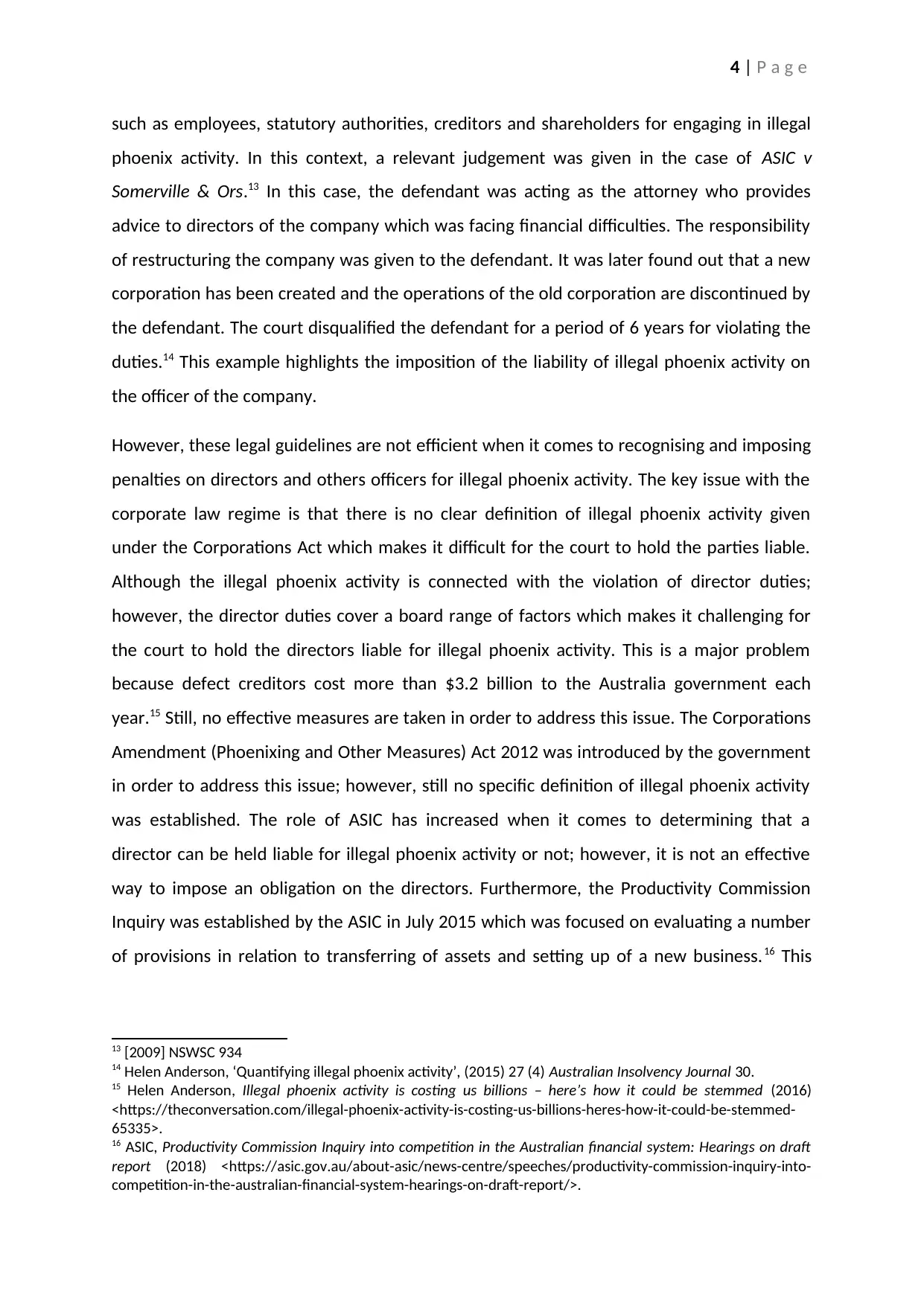
4 | P a g e
such as employees, statutory authorities, creditors and shareholders for engaging in illegal
phoenix activity. In this context, a relevant judgement was given in the case of ASIC v
Somerville & Ors.13 In this case, the defendant was acting as the attorney who provides
advice to directors of the company which was facing financial difficulties. The responsibility
of restructuring the company was given to the defendant. It was later found out that a new
corporation has been created and the operations of the old corporation are discontinued by
the defendant. The court disqualified the defendant for a period of 6 years for violating the
duties.14 This example highlights the imposition of the liability of illegal phoenix activity on
the officer of the company.
However, these legal guidelines are not efficient when it comes to recognising and imposing
penalties on directors and others officers for illegal phoenix activity. The key issue with the
corporate law regime is that there is no clear definition of illegal phoenix activity given
under the Corporations Act which makes it difficult for the court to hold the parties liable.
Although the illegal phoenix activity is connected with the violation of director duties;
however, the director duties cover a board range of factors which makes it challenging for
the court to hold the directors liable for illegal phoenix activity. This is a major problem
because defect creditors cost more than $3.2 billion to the Australia government each
year.15 Still, no effective measures are taken in order to address this issue. The Corporations
Amendment (Phoenixing and Other Measures) Act 2012 was introduced by the government
in order to address this issue; however, still no specific definition of illegal phoenix activity
was established. The role of ASIC has increased when it comes to determining that a
director can be held liable for illegal phoenix activity or not; however, it is not an effective
way to impose an obligation on the directors. Furthermore, the Productivity Commission
Inquiry was established by the ASIC in July 2015 which was focused on evaluating a number
of provisions in relation to transferring of assets and setting up of a new business.16 This
13 [2009] NSWSC 934
14 Helen Anderson, ‘Quantifying illegal phoenix activity’, (2015) 27 (4) Australian Insolvency Journal 30.
15 Helen Anderson, Illegal phoenix activity is costing us billions – here’s how it could be stemmed (2016)
<https://theconversation.com/illegal-phoenix-activity-is-costing-us-billions-heres-how-it-could-be-stemmed-
65335>.
16 ASIC, Productivity Commission Inquiry into competition in the Australian financial system: Hearings on draft
report (2018) <https://asic.gov.au/about-asic/news-centre/speeches/productivity-commission-inquiry-into-
competition-in-the-australian-financial-system-hearings-on-draft-report/>.
such as employees, statutory authorities, creditors and shareholders for engaging in illegal
phoenix activity. In this context, a relevant judgement was given in the case of ASIC v
Somerville & Ors.13 In this case, the defendant was acting as the attorney who provides
advice to directors of the company which was facing financial difficulties. The responsibility
of restructuring the company was given to the defendant. It was later found out that a new
corporation has been created and the operations of the old corporation are discontinued by
the defendant. The court disqualified the defendant for a period of 6 years for violating the
duties.14 This example highlights the imposition of the liability of illegal phoenix activity on
the officer of the company.
However, these legal guidelines are not efficient when it comes to recognising and imposing
penalties on directors and others officers for illegal phoenix activity. The key issue with the
corporate law regime is that there is no clear definition of illegal phoenix activity given
under the Corporations Act which makes it difficult for the court to hold the parties liable.
Although the illegal phoenix activity is connected with the violation of director duties;
however, the director duties cover a board range of factors which makes it challenging for
the court to hold the directors liable for illegal phoenix activity. This is a major problem
because defect creditors cost more than $3.2 billion to the Australia government each
year.15 Still, no effective measures are taken in order to address this issue. The Corporations
Amendment (Phoenixing and Other Measures) Act 2012 was introduced by the government
in order to address this issue; however, still no specific definition of illegal phoenix activity
was established. The role of ASIC has increased when it comes to determining that a
director can be held liable for illegal phoenix activity or not; however, it is not an effective
way to impose an obligation on the directors. Furthermore, the Productivity Commission
Inquiry was established by the ASIC in July 2015 which was focused on evaluating a number
of provisions in relation to transferring of assets and setting up of a new business.16 This
13 [2009] NSWSC 934
14 Helen Anderson, ‘Quantifying illegal phoenix activity’, (2015) 27 (4) Australian Insolvency Journal 30.
15 Helen Anderson, Illegal phoenix activity is costing us billions – here’s how it could be stemmed (2016)
<https://theconversation.com/illegal-phoenix-activity-is-costing-us-billions-heres-how-it-could-be-stemmed-
65335>.
16 ASIC, Productivity Commission Inquiry into competition in the Australian financial system: Hearings on draft
report (2018) <https://asic.gov.au/about-asic/news-centre/speeches/productivity-commission-inquiry-into-
competition-in-the-australian-financial-system-hearings-on-draft-report/>.
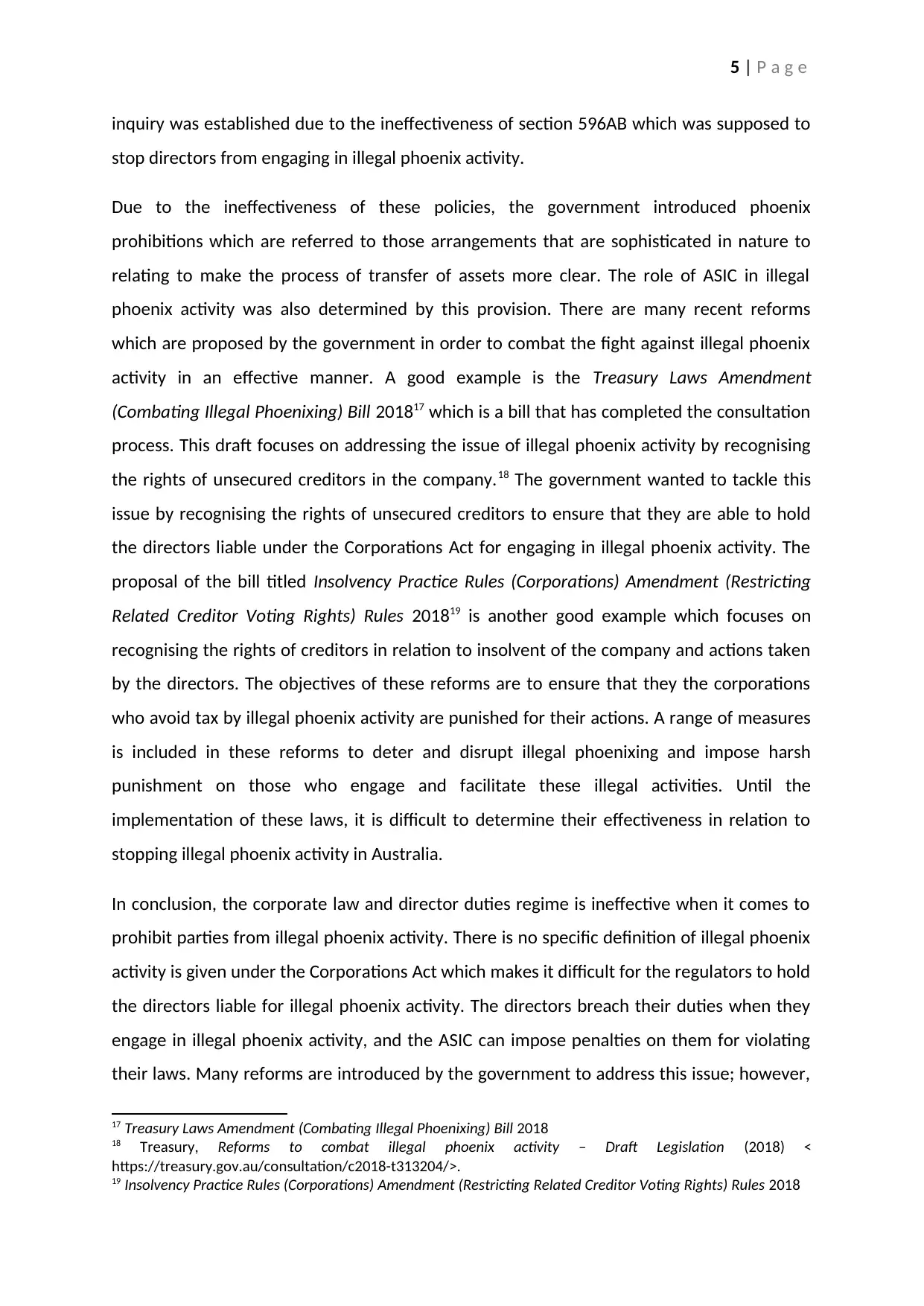
5 | P a g e
inquiry was established due to the ineffectiveness of section 596AB which was supposed to
stop directors from engaging in illegal phoenix activity.
Due to the ineffectiveness of these policies, the government introduced phoenix
prohibitions which are referred to those arrangements that are sophisticated in nature to
relating to make the process of transfer of assets more clear. The role of ASIC in illegal
phoenix activity was also determined by this provision. There are many recent reforms
which are proposed by the government in order to combat the fight against illegal phoenix
activity in an effective manner. A good example is the Treasury Laws Amendment
(Combating Illegal Phoenixing) Bill 201817 which is a bill that has completed the consultation
process. This draft focuses on addressing the issue of illegal phoenix activity by recognising
the rights of unsecured creditors in the company.18 The government wanted to tackle this
issue by recognising the rights of unsecured creditors to ensure that they are able to hold
the directors liable under the Corporations Act for engaging in illegal phoenix activity. The
proposal of the bill titled Insolvency Practice Rules (Corporations) Amendment (Restricting
Related Creditor Voting Rights) Rules 201819 is another good example which focuses on
recognising the rights of creditors in relation to insolvent of the company and actions taken
by the directors. The objectives of these reforms are to ensure that they the corporations
who avoid tax by illegal phoenix activity are punished for their actions. A range of measures
is included in these reforms to deter and disrupt illegal phoenixing and impose harsh
punishment on those who engage and facilitate these illegal activities. Until the
implementation of these laws, it is difficult to determine their effectiveness in relation to
stopping illegal phoenix activity in Australia.
In conclusion, the corporate law and director duties regime is ineffective when it comes to
prohibit parties from illegal phoenix activity. There is no specific definition of illegal phoenix
activity is given under the Corporations Act which makes it difficult for the regulators to hold
the directors liable for illegal phoenix activity. The directors breach their duties when they
engage in illegal phoenix activity, and the ASIC can impose penalties on them for violating
their laws. Many reforms are introduced by the government to address this issue; however,
17 Treasury Laws Amendment (Combating Illegal Phoenixing) Bill 2018
18 Treasury, Reforms to combat illegal phoenix activity – Draft Legislation (2018) <
https://treasury.gov.au/consultation/c2018-t313204/>.
19 Insolvency Practice Rules (Corporations) Amendment (Restricting Related Creditor Voting Rights) Rules 2018
inquiry was established due to the ineffectiveness of section 596AB which was supposed to
stop directors from engaging in illegal phoenix activity.
Due to the ineffectiveness of these policies, the government introduced phoenix
prohibitions which are referred to those arrangements that are sophisticated in nature to
relating to make the process of transfer of assets more clear. The role of ASIC in illegal
phoenix activity was also determined by this provision. There are many recent reforms
which are proposed by the government in order to combat the fight against illegal phoenix
activity in an effective manner. A good example is the Treasury Laws Amendment
(Combating Illegal Phoenixing) Bill 201817 which is a bill that has completed the consultation
process. This draft focuses on addressing the issue of illegal phoenix activity by recognising
the rights of unsecured creditors in the company.18 The government wanted to tackle this
issue by recognising the rights of unsecured creditors to ensure that they are able to hold
the directors liable under the Corporations Act for engaging in illegal phoenix activity. The
proposal of the bill titled Insolvency Practice Rules (Corporations) Amendment (Restricting
Related Creditor Voting Rights) Rules 201819 is another good example which focuses on
recognising the rights of creditors in relation to insolvent of the company and actions taken
by the directors. The objectives of these reforms are to ensure that they the corporations
who avoid tax by illegal phoenix activity are punished for their actions. A range of measures
is included in these reforms to deter and disrupt illegal phoenixing and impose harsh
punishment on those who engage and facilitate these illegal activities. Until the
implementation of these laws, it is difficult to determine their effectiveness in relation to
stopping illegal phoenix activity in Australia.
In conclusion, the corporate law and director duties regime is ineffective when it comes to
prohibit parties from illegal phoenix activity. There is no specific definition of illegal phoenix
activity is given under the Corporations Act which makes it difficult for the regulators to hold
the directors liable for illegal phoenix activity. The directors breach their duties when they
engage in illegal phoenix activity, and the ASIC can impose penalties on them for violating
their laws. Many reforms are introduced by the government to address this issue; however,
17 Treasury Laws Amendment (Combating Illegal Phoenixing) Bill 2018
18 Treasury, Reforms to combat illegal phoenix activity – Draft Legislation (2018) <
https://treasury.gov.au/consultation/c2018-t313204/>.
19 Insolvency Practice Rules (Corporations) Amendment (Restricting Related Creditor Voting Rights) Rules 2018
⊘ This is a preview!⊘
Do you want full access?
Subscribe today to unlock all pages.

Trusted by 1+ million students worldwide

6 | P a g e
they have remained ineffective in the corporate law regime. The latest bills proposed by the
government are focused on recognising the rights of creditors and impose harsh penalties
on directors if they engage in illegal phoenix activity. However, until they are enforced, it is
difficult to determine their effectiveness. The government should define the illegal phoenix
activity in the Corporations Act which would assist in forming stricter policies to hold the
directors liable for engaging in illegal phoenix activity.
they have remained ineffective in the corporate law regime. The latest bills proposed by the
government are focused on recognising the rights of creditors and impose harsh penalties
on directors if they engage in illegal phoenix activity. However, until they are enforced, it is
difficult to determine their effectiveness. The government should define the illegal phoenix
activity in the Corporations Act which would assist in forming stricter policies to hold the
directors liable for engaging in illegal phoenix activity.
Paraphrase This Document
Need a fresh take? Get an instant paraphrase of this document with our AI Paraphraser
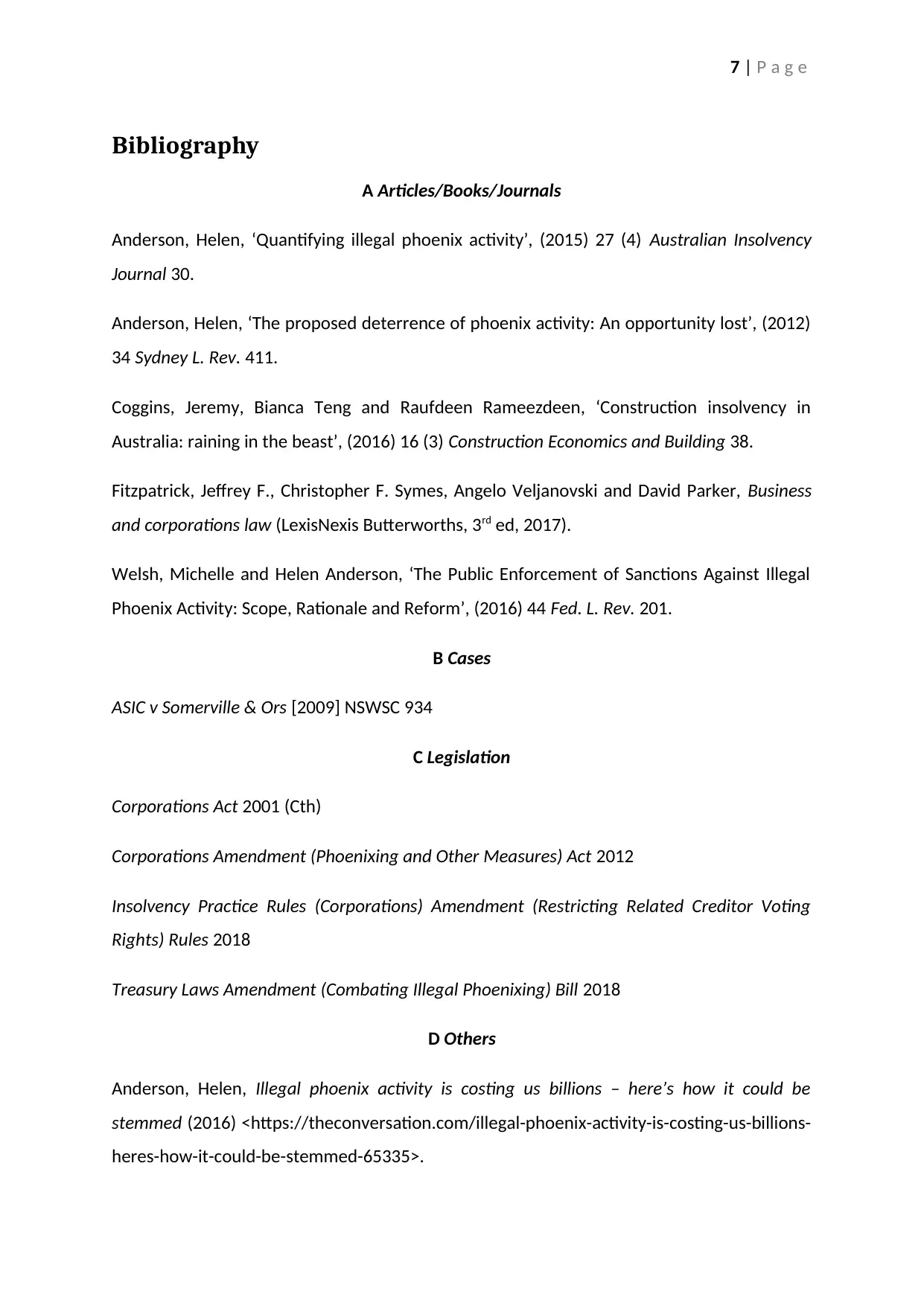
7 | P a g e
Bibliography
A Articles/Books/Journals
Anderson, Helen, ‘Quantifying illegal phoenix activity’, (2015) 27 (4) Australian Insolvency
Journal 30.
Anderson, Helen, ‘The proposed deterrence of phoenix activity: An opportunity lost’, (2012)
34 Sydney L. Rev. 411.
Coggins, Jeremy, Bianca Teng and Raufdeen Rameezdeen, ‘Construction insolvency in
Australia: raining in the beast’, (2016) 16 (3) Construction Economics and Building 38.
Fitzpatrick, Jeffrey F., Christopher F. Symes, Angelo Veljanovski and David Parker, Business
and corporations law (LexisNexis Butterworths, 3rd ed, 2017).
Welsh, Michelle and Helen Anderson, ‘The Public Enforcement of Sanctions Against Illegal
Phoenix Activity: Scope, Rationale and Reform’, (2016) 44 Fed. L. Rev. 201.
B Cases
ASIC v Somerville & Ors [2009] NSWSC 934
C Legislation
Corporations Act 2001 (Cth)
Corporations Amendment (Phoenixing and Other Measures) Act 2012
Insolvency Practice Rules (Corporations) Amendment (Restricting Related Creditor Voting
Rights) Rules 2018
Treasury Laws Amendment (Combating Illegal Phoenixing) Bill 2018
D Others
Anderson, Helen, Illegal phoenix activity is costing us billions – here’s how it could be
stemmed (2016) <https://theconversation.com/illegal-phoenix-activity-is-costing-us-billions-
heres-how-it-could-be-stemmed-65335>.
Bibliography
A Articles/Books/Journals
Anderson, Helen, ‘Quantifying illegal phoenix activity’, (2015) 27 (4) Australian Insolvency
Journal 30.
Anderson, Helen, ‘The proposed deterrence of phoenix activity: An opportunity lost’, (2012)
34 Sydney L. Rev. 411.
Coggins, Jeremy, Bianca Teng and Raufdeen Rameezdeen, ‘Construction insolvency in
Australia: raining in the beast’, (2016) 16 (3) Construction Economics and Building 38.
Fitzpatrick, Jeffrey F., Christopher F. Symes, Angelo Veljanovski and David Parker, Business
and corporations law (LexisNexis Butterworths, 3rd ed, 2017).
Welsh, Michelle and Helen Anderson, ‘The Public Enforcement of Sanctions Against Illegal
Phoenix Activity: Scope, Rationale and Reform’, (2016) 44 Fed. L. Rev. 201.
B Cases
ASIC v Somerville & Ors [2009] NSWSC 934
C Legislation
Corporations Act 2001 (Cth)
Corporations Amendment (Phoenixing and Other Measures) Act 2012
Insolvency Practice Rules (Corporations) Amendment (Restricting Related Creditor Voting
Rights) Rules 2018
Treasury Laws Amendment (Combating Illegal Phoenixing) Bill 2018
D Others
Anderson, Helen, Illegal phoenix activity is costing us billions – here’s how it could be
stemmed (2016) <https://theconversation.com/illegal-phoenix-activity-is-costing-us-billions-
heres-how-it-could-be-stemmed-65335>.
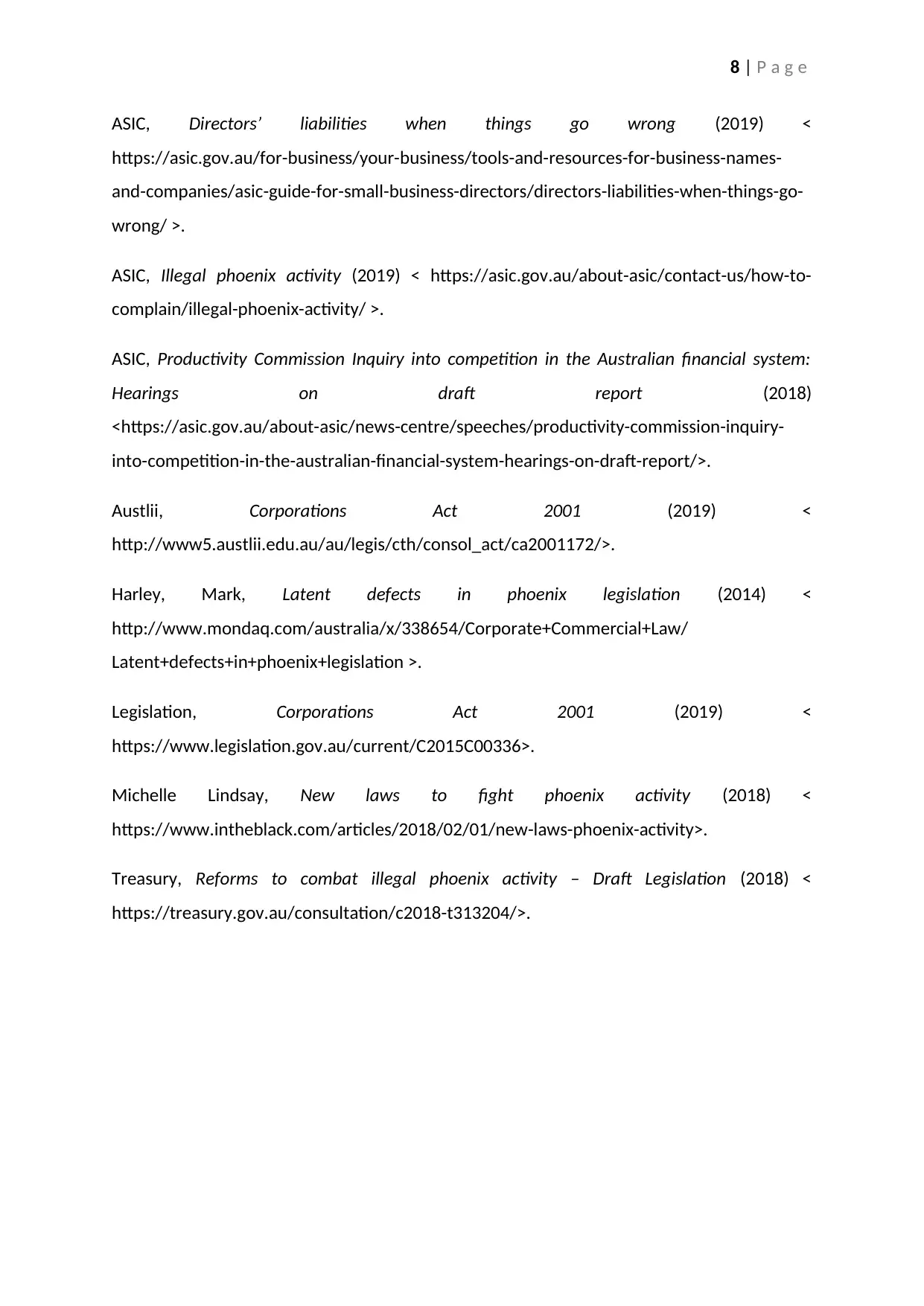
8 | P a g e
ASIC, Directors’ liabilities when things go wrong (2019) <
https://asic.gov.au/for-business/your-business/tools-and-resources-for-business-names-
and-companies/asic-guide-for-small-business-directors/directors-liabilities-when-things-go-
wrong/ >.
ASIC, Illegal phoenix activity (2019) < https://asic.gov.au/about-asic/contact-us/how-to-
complain/illegal-phoenix-activity/ >.
ASIC, Productivity Commission Inquiry into competition in the Australian financial system:
Hearings on draft report (2018)
<https://asic.gov.au/about-asic/news-centre/speeches/productivity-commission-inquiry-
into-competition-in-the-australian-financial-system-hearings-on-draft-report/>.
Austlii, Corporations Act 2001 (2019) <
http://www5.austlii.edu.au/au/legis/cth/consol_act/ca2001172/>.
Harley, Mark, Latent defects in phoenix legislation (2014) <
http://www.mondaq.com/australia/x/338654/Corporate+Commercial+Law/
Latent+defects+in+phoenix+legislation >.
Legislation, Corporations Act 2001 (2019) <
https://www.legislation.gov.au/current/C2015C00336>.
Michelle Lindsay, New laws to fight phoenix activity (2018) <
https://www.intheblack.com/articles/2018/02/01/new-laws-phoenix-activity>.
Treasury, Reforms to combat illegal phoenix activity – Draft Legislation (2018) <
https://treasury.gov.au/consultation/c2018-t313204/>.
ASIC, Directors’ liabilities when things go wrong (2019) <
https://asic.gov.au/for-business/your-business/tools-and-resources-for-business-names-
and-companies/asic-guide-for-small-business-directors/directors-liabilities-when-things-go-
wrong/ >.
ASIC, Illegal phoenix activity (2019) < https://asic.gov.au/about-asic/contact-us/how-to-
complain/illegal-phoenix-activity/ >.
ASIC, Productivity Commission Inquiry into competition in the Australian financial system:
Hearings on draft report (2018)
<https://asic.gov.au/about-asic/news-centre/speeches/productivity-commission-inquiry-
into-competition-in-the-australian-financial-system-hearings-on-draft-report/>.
Austlii, Corporations Act 2001 (2019) <
http://www5.austlii.edu.au/au/legis/cth/consol_act/ca2001172/>.
Harley, Mark, Latent defects in phoenix legislation (2014) <
http://www.mondaq.com/australia/x/338654/Corporate+Commercial+Law/
Latent+defects+in+phoenix+legislation >.
Legislation, Corporations Act 2001 (2019) <
https://www.legislation.gov.au/current/C2015C00336>.
Michelle Lindsay, New laws to fight phoenix activity (2018) <
https://www.intheblack.com/articles/2018/02/01/new-laws-phoenix-activity>.
Treasury, Reforms to combat illegal phoenix activity – Draft Legislation (2018) <
https://treasury.gov.au/consultation/c2018-t313204/>.
⊘ This is a preview!⊘
Do you want full access?
Subscribe today to unlock all pages.

Trusted by 1+ million students worldwide
1 out of 9
Related Documents
Your All-in-One AI-Powered Toolkit for Academic Success.
+13062052269
info@desklib.com
Available 24*7 on WhatsApp / Email
![[object Object]](/_next/static/media/star-bottom.7253800d.svg)
Unlock your academic potential
Copyright © 2020–2026 A2Z Services. All Rights Reserved. Developed and managed by ZUCOL.





